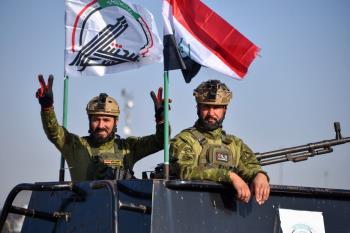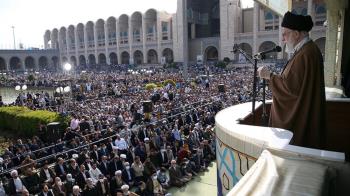Alwaght- The Russian President Vladimir Putin has said that his country’s forces cooperated with a fraction of the so-called Free Syrian Army (FSA), which is an opposition force to the Syria President Bashar al-Assad's government, against the radical terrorists. It seems that Moscow’s meaning of the Syrian opposition is the armed groups that have recently showed more convergence with the Syrian army.
Putin has announced that his country has been providing air cover, weapons and ammunitions to the Free Syrian Army's forces in their joint operations with the Syrian army’s forces against the terrorists. “The work of our aviation group assists in uniting the efforts of government troops and the Free Syrian Army. Now several of its(FSA) units, which are 5,000 in number, are engaged in offensive actions against terrorists, alongside (theSyrian) regular forces, in provinces of Hama, Homs, Aleppo and Raqqa, said Putin.” Last month, Moscow said that the Russian fighter jets bombed the terrorists’ positions, with provided information by the FSA forces. But this is for the first time that Russia is seriously announcing its support for the anti-Assad government’s forces in their battle against the ISIS terrorists in the country.
The Russian are supporting the FSA while this armed group is considered as one of the opposition groups to the Syrian government and it has received supports from the United States, the Saudi Arabia and Turkey. During the past two years the FSA has lost much of its power, being overshadowed by the Salafi-takfiri terrorist groups like ISIS, al-Nusra Front and the Syrian branch of Al-Qaeda terror group. It is said that because the FSA’s members are originally Syrians and do not hold sectarian motives they are seen more moderate, compared to other armed groups in the country such as ISIS terrorists and al-Nusra Front. Russia has been Saying since the beginning that it did not recognize FSA as a terrorist group, so has made efforts to make the group closer to the Syrian government.
Which fraction of the Free Syrian Army?
President Putin did not make it clear in his Friday speech that Russia supported which fraction of the FSA but recently some of the Syrian opposition groups have been receiving air support from the Russian fighter jets.
A couple of days following the shooting down of the Russian bomber over Syria by the Turkish fighter jets, Jaysh al-Thuwar (Army of Revolutionaries in English), which holds close ties with the Syrian Kurdish forces (the People’s Protraction Units), has engaged in a battle with the al-Nusra Front and Ahrar ash-Sham terrorist groups in northern Aleppo. In a statement, the Jaysh al-Thuwar has accused the al-Nusra Front and the Mare' Operations Room, a coalition of other groups majorly belonging to the FSA, of capturing the group’s two villages in an operation in west of Azaz town. The Jaysh al-Thuwar’s forces have responded to these offensives’ centers."This attack showed that there are groups that claim to be revolutionaries but in fact, they are at the service of the Syrian revolution’s enemies.” A group close to the Syrian Observatory for Human Rights, base in London, at that time noted that some warplanes carried out airstrikes in support of the Jaysh al-Thuwar in the region. The group did not clarify, which country the fighters belonged but at the time some local sources reported that the Russian jets conducted the attacks. Abu Omar, a commander of one of the groups fighting against the Jaysh al-Thuwar has told the media close to the Syria opposition groups that the Russian jets launched airstrikes on the anti-Kurdish forces.“ We think that this is an open and blatant cooperation between the Jaysh al-Thuwar’s militants and the Russian military campaign”, Abu Omar told Zaman al Wasl news. Being a Free Syrian Army-allied armed group, Jaysh al-Thuwar was established in May 2015. The group was merged into the Syrian Democratic Forces under the US support. In addition to Jaysh al-Thuwar, the Syrian Democratic forces include Euphrates Volcano Operations Room (Burkan al-Furat in Arabic), Al-Sanadid Forces and the Syriac Military Council, and the Kurdish People’s Protection Units with about 30,000 organized fighters almost lead the group.
The Russian goals
Although the Syrian Democratic Forces enjoy the American support, the group in past two weeks conducted attacks that drew the Russian complacency and support and at the same time added to the US concerns. It seems that the Russians are following multiple objectives by cooperating with the Syrian government’s opponents. Proximity of Jaysh al-Thuwar and the Syrian Democratic Forces’ to Russia would intensify the gaps between the Syrian opposition groups. The al-Nusra Front was furious that some parts of the FSA have joined the Syrian Democratic Forces and has laid down hurdles ahead of the group’s attempts to launch attacks against ISIS in northern Syria, according to Khaled al-Zino, a spokesman for Jaysh al-Thuwar, who talked to Syria Direct news website. Additionally, the analysts suggest that one of the most important Russian goals is to set new principles in Syria in order to tie Turkey down in Syria. Moscow is well aware about the divides between the US and Turkey over the Syrian Kurds. While Ankara sees the People’s Protection Units as the Syrian branch of the Kurdistan Workers’ Party (PKK) and considers it a terrorist group, Washington views the force as the most significant and most confident ally to be counted on to battle against the terror group ISIS. Recently, Russia has helped the Syrian Democratic Forces to capture a 60-miles area from Jerablos to Azaz, stretching along the Turkish-Syrian borders. To capture the whole area, the Kurdish forces have to bring under their control the town of Jerablos which is held by ISIS group. Strategically, Jerablos is located on the southern bank of the Euphrates River which separates Syria from Turkey. Jerablos also contains the last border path for ISIS towards the Turkish territories, and once it is fully captured, it would pose a real challenge for the ISIS’ militants because it cuts one of the ISIS’ supply lines to Raqqa city, the group’s stronghold in Syria. Turkey has set the Kurds’ control of the area as its red line, however, with the conditions developing after the downing of the Russian bomber in northern Syria, it does not seem that Turkey would dare taking direct action to hold back the Kurdish forces’ advances in the area. Last week, the Russian strike jets carried out airstrikes on the ISIS’ positons in Jerablos, clearing the way for People’s Protection Units’ progress in the town’s outskirts, which overlook the Euphrates River.


























